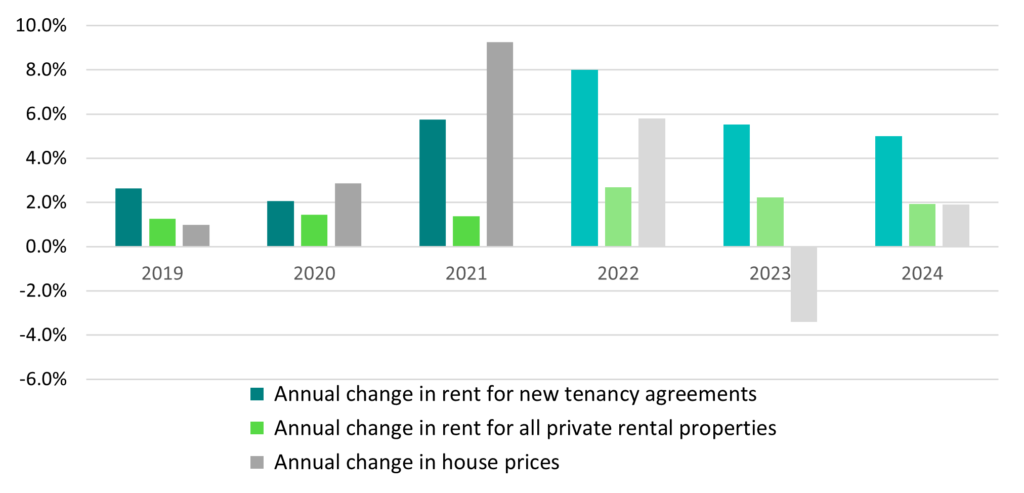It’s not a great time to move to a new rented home. The average rent agreed for new contracts rose by 10.6% across the UK in the year to May 2022, with prices in London rising the fastest – at 15.7%1. This is considerably up on rent increases at the same time last year when the UK annual growth rate stood at 4.0%, while the 2019 average was just 2.6%. As a result, the average rent now takes up roughly 40% of average total pay per month2.
The good news for tenants is that we do expect this growth in rents to slow. We anticipate an 8.0% increase in rents for new tenancy agreements in 2022, which is expected to fall to around 5.0% for the next two years. Meanwhile, the stickier prices looking at all rental properties on average are expected to rise from 1.4% in 2021, to 2.7% in 2022 and 2.2% in 20233. Landlords often increase rents for existing tenants at a slower rate than on properties they are re-letting, meaning growth in rent for all properties tends to be lower than growth in rent for new contracts. As there are many rents that stand well below the market rate, that will only increase when the property is relet, growth in rent for all properties is expected to lag that of new contracts, remaining at a higher rate into early next year.
Considering the factors influencing growth rates in rent, there are several opposing forces. Firstly, there is a supply issue driving up prices, which has been highlighted in the past month by the reaction of many landlords to the Renters’ Reform Bill4. The proposals scrap Section 21 evictions and force landlords to accept pets, among other changes, making ownership of buy-to-let properties less attractive. An even greater issue for landlords, however, is rising interest rates. With five consecutive base rate rises from the Bank of England since last December, flexible rate mortgages have become far more expensive, leading to higher costs for landlords.
On the other hand, the ability for tenants to pay for the very large rent rises currently being seen on the market is falling considerably. Cebr’s Income Tracker for Asda, which looks at household income adjusted for taxes and essential spending, shows that family spending power was down by £40.38 a week year-on-year in April (a 16.5% annual decrease). A key factor behind this fall in spending power is the rise in energy prices, with Ofgem increasing the energy price cap by 54% in April. Clearly, the accelerating cost of renting a home is only compounding the cost-of-living crisis, as energy bills, taxes and food prices, among other costs, have also been increasing at rapid paces. While some tenants have been able to absorb the increasing rents thus far, there will come a point when affordability concerns lead to demand falling back and rent growth slowing. The bad news therefore is that the slowdown in rental growth rates is driven by a general softening in the market due to the worsening cost of living crisis.
While Cebr forecasts house prices to fall in 2023, the upwards pressures on rental prices are set to persist, such that we still expect private rental prices to rise next year, albeit at a slower rate. As the Government plans reforms to the housing market, including the Renters’ Reform Bill and expanding Right to Buy, it needs to consider the impacts on rental affordability for the millions of households paying a sizable chuck of their salary to their landlord each month.
1 https://homelet.co.uk/homelet-rental-index
2 Using HomeLet data and ONS total average weekly earnings for April 2022
4 https://propertyindustryeye.com/property-industry-reaction-to-rental-reform-whitepaper-proposals/
Figure 1: Annual change in rent for new tenants and all private rentals, compared to annual house price growth, with Cebr’s forecast from 2022

For more information please contact:
Josie Dent, Managing Economist Email jdent@cebr.com Phone 020 7324 2864
Cebr is an independent London-based economic consultancy specialising in economic impact assessment, macroeconomic forecasting and thought leadership. For more information on this report, or if you are interested in commissioning research with Cebr, please contact us using our enquiries page.
